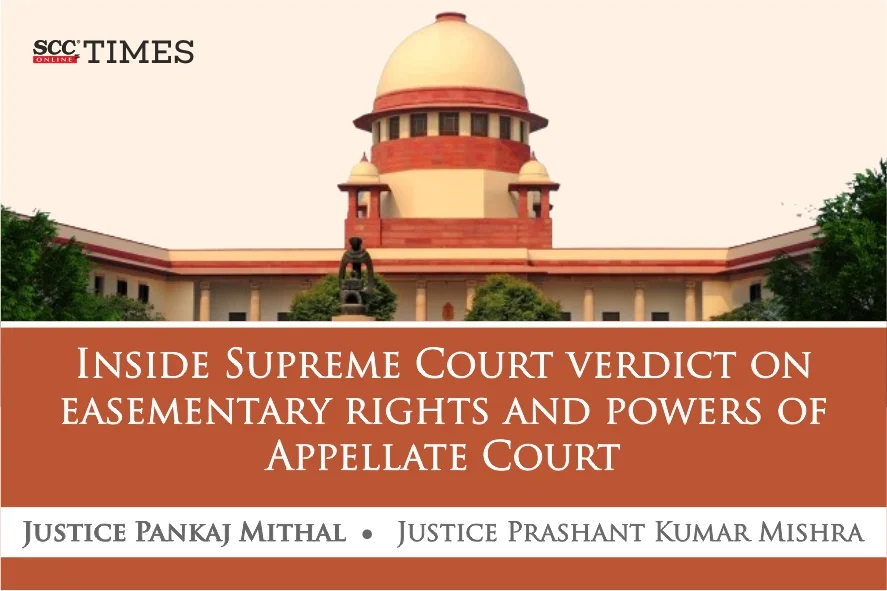Supreme Court: In appeals concerning easementary rights over a road situated over land, which is presently owned by the respondents, the division bench of Pankaj Mithal* and Prashant Kumar Mishra, JJ. held that the appellants have not acquired easementary right over the disputed ‘rasta’ in any manner much less by prescription, necessity or under an agreement. Therefore, the Appellate Courts and the High Court have not committed any error of law in dismissing suit appellants and in decreeing suit of respondents.
The Court noted that ‘Easement’ is defined under Section 4 of the Indian Easements Act, 1882, (‘Act’) and said that the land which is to be enjoyed by the beneficiary is called ‘Dominant Heritage’ and the land on which the easement is claimed is called ‘Servient Heritage’. The easementary right is essentially a right claimed by the owner of land upon another land owned by someone else so that he may enjoy his property in the most beneficial manner.
Examining if the appellant has acquired any easementary right over the ‘rasta’ in dispute existing on the servient heritage, the Court took note of Section 15 of the Act, which provides that for acquiring any easementary right by prescription, the said right must have been peaceably enjoyed in respect of the servient heritage without any interruption for over 20 years.
The Bench noted that in the plaint, neither the respondent nor the appellant specifically claimed that they or their predecessor-in interest were enjoying easementary right of use of the said rasta for over 20 years. They simply alleged that they have been using and managing the same since “last many years”. The use of the term “last many years” is not sufficient to mean that they have been enjoying the same for the last 20 years. The ‘last many years’ would indicate use of the said rasta for more than a year prior to the suit or for some years but certainly would not mean a period of 20 or more years. Therefore, the Court said that their pleadings fall short of meeting the legal requirement of acquiring easementary right through prescription.
The Bench further reiterated that the Power of Attorney holder can only depose about the facts within his personal knowledge and not about those facts which are not within his knowledge or are within the personal knowledge of the person who he represents or about the facts that may have transpired much before he entered the scene.
The Court said that the aforesaid Power of Attorney holder had clearly deposed that he is giving evidence on behalf of the appellant. He did not have any authority to act as the Power of Attorney of the appellant at the time his statement was recorded. He was granted Power of Attorney subsequently as submitted and accepted by the parties. Therefore, his evidence is completely meaningless to establish that appellant has acquired or perfected any easementary right over the disputed rasta in 1994 when the suit was instituted.
The Court said that the easementary right by necessity could be acquired only in accordance with Section 13 of the Act which provides that such easementary right would arise if it is necessary for enjoying the Dominant Heritage. The court noted that in the instant case, findings have been returned not only by the Appellate Courts but even by the Trial Court that there is an alternative way to access the Dominant Heritage, which may be a little far away which demolishes the easement of necessity.
Thus, the Court held that the appellant is not entitled to any easementary right by necessity upon the disputed rasta.
The Court said that it is not the case of the appellant that their predecessor-in-interest had acquired or purchased the said property from government auction with any easementary right over the rasta in dispute. Thus, the appellant has failed to prove that they have acquired any easementary right under the sale deed.
Concerning the powers of the appellate court in disturbing the findings recorded by the Court of first instance, the Court took note of Section 107 of the Code of Civil Procedure, 1908, and said that the first appellate court is empowered to exercise powers and to perform nearly the same duties as of the courts of original jurisdiction. Therefore, the first appellate court has the power to return findings of fact and law both, and in so returning the finding, it can impliedly overturn the findings of the court of first instance if it is against the evidence on record or is otherwise based upon incorrect interpretation of any document or misconstruction of any evidence adduced before the court of first instance.
Thus, the Court held that the appellants have not acquired easementary right over the disputed rasta in any manner much less by prescription, necessity or under an agreement.
CASE DETAILS
2024 SCC OnLine SC 530 Appellants : Respondents : |
Advocates who appeared in this case For Petitioners: For Respondent(s): |
CORAM :








